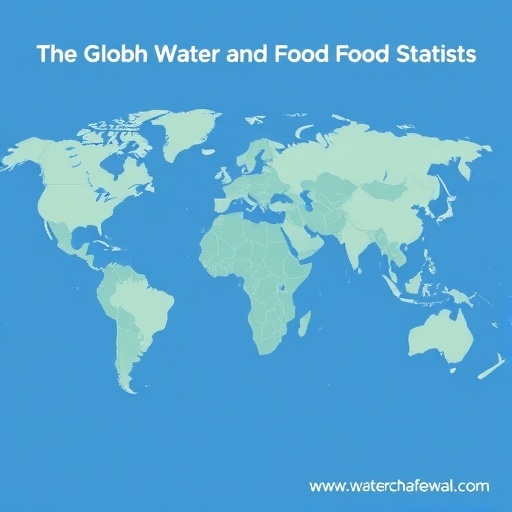A longstanding statistic stating that irrigation agriculture accounts for 40% of global crop production and consumes 70% of the world’s freshwater resources has underpinned much of the dialogue surrounding food security policies and research. However, a recent comprehensive investigation by scholars at the University of Birmingham reveals that this oft-cited figure is largely anecdotal and lacks robust empirical support. The implications of this finding challenge foundational assumptions in global water management and agricultural planning, calling for a critical reassessment of what we accept as scientific fact in this vital domain.
The University of Birmingham research team undertook a systematic examination of the citation trail for these figures, finding that over the past five decades, this pair of statistics—a 40% contribution of irrigation to global agricultural output and a 70% share of freshwater usage—has featured in more than 3,500 scientific, policy, and advocacy documents. Despite their pervasive use, the original data sources and the methodological underpinnings of these percentages have remained elusive, rendering the figures’ empirical foundations suspect. Surprisingly, only a scant 1.5% of these references presented original, verifiable data, while the rest merely repeated the claims without substantiation or omitted them altogether.
Dr. Arnald Puy, the study’s lead author and an Associate Professor specializing in hydrological and agricultural systems, highlights the appeal of these statistics despite their dubious origins. He notes that the simplicity and emotional resonance of the 40% and 70% figures have facilitated their widespread acceptance. They enable stakeholders to convey complex food-water interdependencies with seemingly incontrovertible numerical benchmarks. However, such reductionism glosses over the multifaceted, context-dependent realities of irrigation’s role in global food systems and freshwater consumption. Dr. Puy cautions that reliance on simplistic metrics in an arena marked by significant uncertainty risks misguiding policy formulation and resource allocation efforts worldwide.
Further complicating the narrative, the investigative study underscores substantial variability and ambiguity in the true magnitude of irrigation’s impact. Current rigorous data indicate that irrigation’s share in global crop production could realistically be as low as 18% or escalate to 50%, while estimates of freshwater withdrawals attributed to irrigation range widely between 45% and 90%. These discrepancies expose critical data gaps and highlight an urgent need for refined measurement and intelligent interpretation of irrigation-related water use in both scientific inquiry and policy dialogues.
Seth N. Linga, a doctoral candidate co-authoring the research, emphasizes the consequences of these ambiguous estimates. “Irrigation’s precise contribution to feeding the world remains nebulous, with data supporting multiple plausible perspectives,” Linga explains. He remarks on the spectrum of interpretations: some data portray irrigation as a relatively minor player in global food security, whereas alternate sources position it as indispensable to agricultural productivity. Similarly, water use efficiency assessments vary dramatically, undermining attempts to categorize irrigation systems as definitively sustainable or wasteful.
This wide uncertainty, the researchers argue, compels a shift away from relying on global aggregate figures towards locally nuanced, context-specific strategies. Carmen Aguiló-Rivera, another doctoral researcher engaged in the study, proposes that resilient food and water policies should focus less on achieving precision in contentious global statistics and more on collaboration with ground-level stakeholders. Such engagement enables the identification of regionally appropriate interventions that optimize water usage and crop yields without being tethered to potentially misleading universal benchmarks.
The discourse on irrigation’s role is further complicated by evolving agricultural practices, climate variability, and regional disparities in water resource availability. These dynamics challenge any static global figure’s relevancy. The University of Birmingham research underscores the imperative for improved global monitoring frameworks that embrace data heterogeneity and uncertainty, promoting adaptive management rather than rigid adherence to outdated numerical dogmas.
As international platforms like COP30 convene to chart sustainable pathways amid mounting climate pressures, this new body of work stimulates a timely reevaluation of foundational data driving policy instruments. The current state of water-use statistics employed in food security discussions fails to capture the complexity and fluidity inherent in agricultural water management. Recognizing and integrating this nuance is critical for crafting effective climate adaptation and mitigation strategies that safeguard both food systems and freshwater ecosystems.
The research presented in PNAS Nexus serves as a clarion call for the scientific community to scrutinize the evidentiary quality supporting commonly used statistics. Beyond irrigation, it exemplifies the broader challenges of research ethics and academic rigor in environmental and resource sciences, reminding us that the utility of data hinges on its verifiable accuracy and contextual appropriateness. Innovations in remote sensing, data analytics, and participatory monitoring may offer pathways to bridge existing knowledge gaps, but rigorous methodological standards and transparency must underpin all advancements.
In conclusion, the assumption that irrigation uniformly produces 40% of the world’s crops and commands 70% of freshwater is not only an oversimplification but a misleading statistic that has permeated academic and policy spheres for decades without sufficient empirical validation. Revisiting and refining these critical indicators is essential for more scientifically grounded discussions and decisions about food security, water governance, and sustainable development. Embracing complexity and uncertainty over convenient certainties will better equip global stakeholders to navigate the intertwined challenges of feeding a growing population while preserving finite water resources.
Subject of Research:
Role and impact of irrigation in global food production and freshwater use, and the empirical validity of widely cited global irrigation statistics.
Article Title:
Widely cited global irrigation statistics lack empirical support
News Publication Date:
11-Nov-2025
Web References:
https://doi.org/10.1093/pnasnexus/pgaf323
Keywords:
Food security; Global food security; Water scarcity; Water supply; Academic ethics; Research ethics




